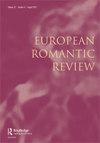New Romanticisms
IF 0.1
0 HUMANITIES, MULTIDISCIPLINARY
引用次数: 0
Abstract
The joint NASSR/BARS conference, “New Romanticisms,” eventually held at Edge Hill University in August 2022, grew from a silly pun on the New Romantics, a 1980s musical subculture characterized by flamboyant fashion, into a serious consideration of new approaches to Romantic studies, asking how and why we study Romanticism today. Originally planned for August 2021 as a straightforwardly in-person affair, the “New Romanticisms” which took place a year later in a world transformed by the Covid-19 pandemic had to consider how scholars of Romanticism could gather together safely, opting for a hybrid mode combining in-person conviviality with inclusive online access. Inclusivity and conviviality were the watchwords of the conference, bringing Romanticists back together in multiple forms after painful separation. The essays gathered for this special issue reflect the ethos of the conference, combining diversity and collaboration to think about the multiplicity of Romanticisms available to scholars today. We begin by celebrating the winners of the joint NASSR/BARS Graduate Student Essay Prizes, Dana Moss and Diana Little. In “Waste in the Nineteenth-Century Lyric,” Dana Moss explores an erotics of waste whereby, in Shelley’s “The SensitivePlant,” plants thrive as they rot, so that things already used enter into a queer mode of survival, a nonhuman thriving. Diana Little’s “Wordsworth’s Webs: Spinning the Ecological Elegy” explores the relationship between Wordsworth’s elegiac practice and ecological interests in two poems which probe the natural world’s resistance to being co-opted by the pathetic fallacy. Little argues not only that ecological concerns inform Wordsworth’s poetic elegies but also that the elegy form as practiced by Wordsworth, alert to the disconnections between humans and our environment, has something to teach ecology. The next section of this special issue privileges the ethos of collaboration which informed “New Romanticisms” with a series of co-authored articles reflecting upon panels embodying the international spirit of the conference. Indu Ohri and Lenora Hanson’s “Reflections on Remixing Romanticism: A Plenary Workshop on Anti-Racist Teaching” argues for the importance of anti-racist teaching by setting out how to create an inclusive and activist classroom through making links between international experiences of injustice and revolution. The series of co-authored articles which follow Ohri and Hanson’s reflections remix Romanticism in their own idiosyncratic ways from the musical to the environmental. Amanda Blake Davis and Matthew Sangster’s “‘Load Every Rift’: Power, Opposition, and Community in Romantic Poetry and新浪漫主义
NASSR/BARS的联合会议“新浪漫主义”最终于2022年8月在边山大学举行,会议从对新浪漫主义(20世纪80年代以华丽时尚为特征的音乐亚文化)的愚蠢双关,发展成为对浪漫主义研究新方法的认真考虑,询问我们今天如何以及为什么要研究浪漫主义。原本计划在2021年8月举行的“新浪漫主义”活动是一场直接面对面的活动,但在一年后发生的新冠肺炎大流行改变了世界,它不得不考虑浪漫主义学者如何安全地聚集在一起,选择了一种将面对面的欢乐与包容性的在线访问相结合的混合模式。这次会议的口号是包容和欢乐,让浪漫主义者在痛苦的分离后以多种形式重新走到一起。为本期特刊收集的文章反映了会议的精神,将多样性和合作结合起来,思考当今学者可以使用的浪漫主义的多样性。我们首先向NASSR/BARS研究生联合论文奖的获奖者Dana Moss和Diana Little表示祝贺。在《19世纪抒情诗中的浪费》(Waste In the 19 century Lyric)一书中,达纳·莫斯(Dana Moss)探讨了一种浪费的情色,在雪莱的《敏感植物》(the SensitivePlant)中,植物在腐烂中茁壮成长,因此,已经使用过的东西进入了一种奇怪的生存模式,一种非人类的繁荣。戴安娜·利特尔的《华兹华斯的网:编织生态挽歌》通过两首诗探讨了华兹华斯的挽歌实践与生态利益之间的关系,这两首诗探讨了自然世界对悲剧谬误的抵制。利特尔认为,华兹华斯的挽歌不仅体现了对生态的关注,而且华兹华斯所采用的哀歌形式,对人类与环境之间的脱节保持警惕,对生态学有一定的启示。本期特刊的下一部分将以一系列共同撰写的文章来反映体现会议国际精神的小组讨论,为“新浪漫主义”提供合作精神的特权。Indu Ohri和Lenora Hanson的“对混合浪漫主义的反思:反种族主义教学全体研讨会”提出了反种族主义教学的重要性,阐述了如何通过将不公正的国际经验与革命联系起来,创造一个包容和积极的课堂。Ohri和Hanson的一系列共同撰写的文章,从音乐到环境,以他们自己独特的方式重新融合了浪漫主义。阿曼达·布莱克·戴维斯和马修·桑斯特的《承载每一个裂痕》:浪漫主义诗歌中的权力、反对和社区》
本文章由计算机程序翻译,如有差异,请以英文原文为准。
求助全文
约1分钟内获得全文
求助全文
来源期刊

European Romantic Review
HUMANITIES, MULTIDISCIPLINARY-
CiteScore
0.30
自引率
50.00%
发文量
61
期刊介绍:
The European Romantic Review publishes innovative scholarship on the literature and culture of Europe, Great Britain and the Americas during the period 1760-1840. Topics range from the scientific and psychological interests of German and English authors through the political and social reverberations of the French Revolution to the philosophical and ecological implications of Anglo-American nature writing. Selected papers from the annual conference of the North American Society for the Study of Romanticism appear in one of the five issues published each year.
 求助内容:
求助内容: 应助结果提醒方式:
应助结果提醒方式:


